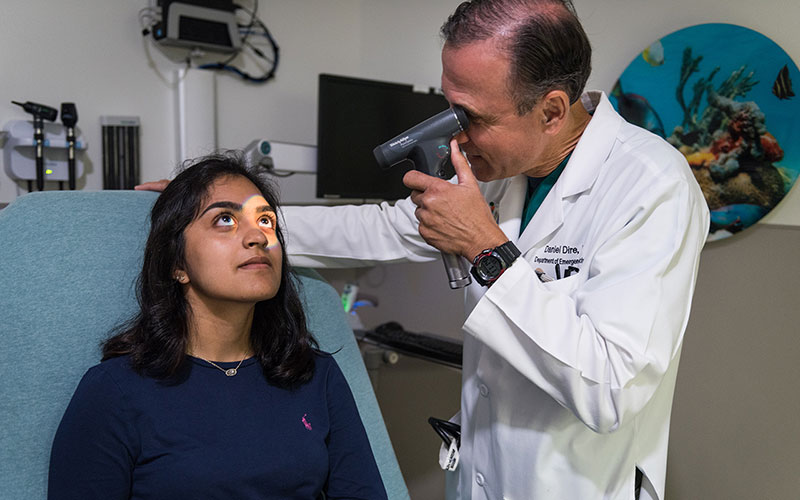Most people think of a concussion being the result of a sports injury, but a concussion can happen anywhere. Bumped your head on a cabinet? Your child fell off their bike? Even a small jolt can cause a concussion.
What Is a Concussion?
A concussion is a mild traumatic brain injury (TBI). It happens when your head gets hit, bumped or jolted. A TBI also can happen if your body takes a hard hit that makes your head snap back and forth, like a football tackle or hard fall to the ground.
When this happens, the brain moves quickly inside the skull, almost like it’s bouncing around. This sudden movement can cause changes in the brain that affect how it works.
Symptoms of a Concussion
The brain is the control center for the entire body, so when it gets injured in any way, multiple symptoms can occur. Symptoms of a traumatic brain injury tend to fall into two broad categories: behaviors that can be observed by someone else and abnormal sensations that are reported by the person with the injury.
How to Spot a Concussion
Someone around you might have a concussion if they:
- Appear confused
- Can’t remember what happened before or after the hit or fall
- Show changes in mood or behavior
- Reply slowly to questions
- Stumble or appear dizzy
Symptoms You Shouldn’t Ignore
Someone with a concussion can experience:
- Balance difficulties
- Concentration difficulties
- Dizziness or lightheadedness
- Headache or head pressure
- Nausea or vomiting
- Problems with vision
- Sluggishness
If You Have Children
A study by the Centers for Disease Control and Prevention found nearly 70% of emergency visits for sports and recreation-related head injuries involve kids 17 and under. Younger children, especially toddlers, may have trouble explaining how they feel. If you have little ones, watch out for:
- Irritability
- Excessive crying
- Change in eating or sleeping patterns
- Loss of interest in favorite toys
A concussion may or may not cause loss of consciousness. In fact, most people don’t pass out when they experience a traumatic brain injury.
What Are the Long-Term Effects of a Concussion?
Some symptoms of a traumatic brain injury, including dizziness, fade away within a few days or weeks. However, the impact can disrupt the brain process for months or years, causing lingering effects to their quality of life.
The most common long-term effects of a concussion include:
- Brain fog
- Memory loss
- Difficulty concentrating
- Diminished problem-solving skills
- Depression
- Anxiety
- Post-traumatic headaches
- Vision problems
- Persistent exhaustion
- Behavioral issues
- Sleep disorders such as insomnia
In most cases, concussion symptoms go away within six weeks. If the symptoms linger for three months or longer, the cluster of symptoms is called post-concussive syndrome.
How Do You Treat a Concussion?
Mild traumatic brain injuries are typically treated by resting the brain with enough sleep and by avoiding activities for a short time. Most are treated in the emergency department or primary care clinic. Individual symptoms, such as headache, may be treated using over-the-counter or prescription medications, as needed.
When Do I Need Emergency Care?
Seek immediate emergency care if you notice the following symptoms after a potential concussion:
- Extreme drowsiness
- Worsening headache
- Weakness or numbness in any part of the body
- Slurring of speech
- Ongoing vomiting
- Seizures
- Loss of consciousness
- Worsening confusion or agitation
- Repeated vomiting
- Unequal or dilated pupils
It is important for anyone who experiences a TBI to avoid a repeated head injury in the future as the effects of multiple concussions can be more severe. This is especially important for those who experience post-concussive syndrome.
Emergency Care at University Health
Children who are in need of emergency care can go to the Harvey E. Najim Children’s Emergency Department, located within the Women’s & Children’s Hospital. Adults can go directly to University Hospital.
Our emergency care services are available 24 hours a day, 7 days a week to both adult and pediatric patients. We also have the only Level I trauma center and Level I pediatric trauma center in South Texas.




